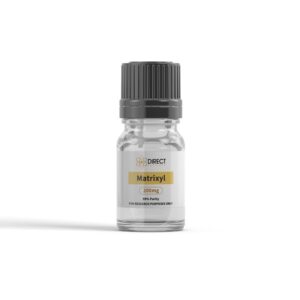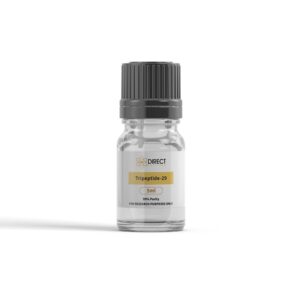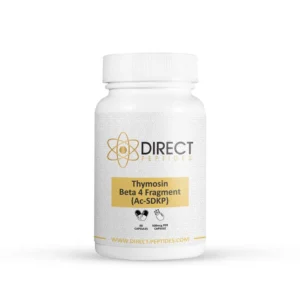The role of topical peptides in stimulating collagen production is a topic that has gained significant attention in anti-aging research. These small, powerful molecules are currently being studied for their potential to enhance skin structure and help combat the visible effects of aging, such as wrinkles, fine lines, and sagging skin.
While topical peptides are primarily researched for their potential uses in skin rejuvenation, they are still not intended for personal use and are only applied within controlled clinical studies.
In this article, we will explore how peptides for anti-aging work in the skin, the science behind collagen production, and the promising peptide types that are being studied for skin regeneration.
Let’s dive into the research behind topical peptides and how they may one day revolutionize the way we approach anti-aging treatments.
Explore ALL Topical Peptides, 99% Pure online at Direct Peptides today!
Peptides are short chains of amino acids, the building blocks of proteins. They play crucial roles in cellular communication and regulation within the body.
When it comes to anti-aging research, topical peptides are being investigated for their ability to penetrate the skin’s layers and communicate with skin cells, triggering various biological processes that could potentially enhance collagen production and promote skin regeneration.
These peptides are primarily being studied for their ability to support collagen stimulation in the skin, which is vital for maintaining its firmness, elasticity, and overall youthful appearance.
The peptides for skin regeneration that are currently under investigation include both well-known compounds like Matrixyl and newer, promising peptides, which we will explore further in the following sections.
However, it’s important to note that while these peptides show promise, they are still in research environments and clinical trials and are not intended for direct personal application.
Explore Peptide Supplies at Direct Peptides for all your reconstitution requirements.
Collagen is a key structural protein in the skin that helps maintain its strength and elasticity. As we age, the natural production of collagen slows, leading to sagging, wrinkles, and fine lines. Research studies on topical peptides aim to understand how these peptides can potentially boost the production of collagen, helping to rejuvenate the skin.
In clinical trials, peptides are being applied to the skin to encourage the fibroblasts (cells that produce collagen) to increase collagen synthesis. By enhancing collagen production, peptides may help the skin regain some of its firmness and elasticity, resulting in smoother skin with fewer wrinkles and less sagging.
Researchers are focusing on peptides for collagen stimulation, particularly for their ability to re-energize the skin’s natural collagen synthesis, as it slows down with age. For example, Matrixyl is one peptide that has shown promise in stimulating collagen production, with some studies revealing that it can reduce the appearance of fine lines and improve skin texture.
The aging process reduces the skin’s ability to produce collagen, which is why collagen production plays such a central role in maintaining youthful skin. Collagen provides structure and support for the skin, and as its levels decrease, the skin begins to sag, wrinkle, and lose its firmness.
Topical peptides have the potential to reverse this process by signaling the skin to ramp up collagen production, leading to firmer, more youthful skin.
Understanding how topical peptides work to boost collagen is essential for anyone interested in the research behind anti-aging peptides. These peptides could eventually offer a non-invasive way to help restore the skin’s elasticity and smooth out the visible signs of aging.
Several peptides are currently being studied in clinical research for their potential to promote collagen stimulation and support skin regeneration. Here are some of the key peptides that are being investigated for their ability to improve skin structure and reduce signs of aging:
 One of the most well-known peptides being researched for collagen production is Matrixyl, also known as Palmitoyl Pentapeptide-4. This peptide has been shown in multiple studies to stimulate collagen synthesis and improve the appearance of fine lines and wrinkles.
One of the most well-known peptides being researched for collagen production is Matrixyl, also known as Palmitoyl Pentapeptide-4. This peptide has been shown in multiple studies to stimulate collagen synthesis and improve the appearance of fine lines and wrinkles.
Research suggests that Matrixyl works by encouraging fibroblasts to produce more collagen and elastin, which leads to improved skin texture and elasticity.
In one clinical study, participants who used products containing Matrixyl saw a significant reduction in wrinkle depth and an improvement in overall skin appearance. While Matrixyl is promising, it is still under investigation and not yet available for personal use outside of clinical trials.
Discover Matrixyl from Direct Peptides , a powerful peptide that promotes collagen production, reducing the appearance of fine lines and improving skin texture.
 Tripeptide-29 is a peptide being researched for its regenerative properties.
Tripeptide-29 is a peptide being researched for its regenerative properties.
This peptide plays a crucial role in collagen synthesis and has shown promise in supporting skin healing.
Tripeptide-29 also possesses antioxidant properties that can help protect the skin from oxidative stress caused by environmental factors such as pollution and UV radiation.
Research into Tripeptide-29 suggests that it may improve skin elasticity and texture by stimulating collagen production and promoting overall skin health.
Like other anti-aging peptides, Tripeptide-29 is still in the research phase, with ongoing studies exploring its full potential for skin rejuvenation.
Explore Tripeptide-29 from Direct Peptides , a powerful peptide that plays a key role in collagen synthesis, helping to enhance skin elasticity and improve overall skin texture.
Acetyl Hexapeptide-8, also known as Argireline, is a peptide often referred to as a botox-like alternative. This peptide works by inhibiting the release of neurotransmitters that cause facial muscles to contract, which helps to reduce the depth of wrinkles, particularly around the forehead and eyes.
In clinical trials, Argireline has shown potential as a wrinkle reduction peptide by mimicking the effects of botox in a more gradual, non-invasive manner.
However, as with all peptides in research, Argireline is not available for personal use and is still being studied for its long-term effectiveness in anti-aging treatments.
Discover Acetyl Hexapeptide-8 from Direct Peptides , a peptide that mimics botox by relaxing facial muscles, reducing expression lines around the eyes and forehead.
In addition to stimulating collagen production, some peptides are also being studied for their potential to support skin regeneration. These peptides may help accelerate skin healing, improve skin texture, and reduce the appearance of scars, which are common signs of aging.
 BPC-157 is a peptide that has shown promise in accelerating skin repair and regeneration. Research on BPC-157 indicates that it can reduce inflammation and stimulate the healing of damaged tissue.
BPC-157 is a peptide that has shown promise in accelerating skin repair and regeneration. Research on BPC-157 indicates that it can reduce inflammation and stimulate the healing of damaged tissue.
In preclinical studies, this peptide has been shown to help reduce the appearance of scars and improve skin texture. However, it is important to note that BPC-157 is still undergoing research and is not intended for personal application.
Check out BPC-157 from Direct Peptides , a peptide known for its ability to reduce inflammation and accelerate skin healing, helping to preserve collagen and promote a youthful complexion.
 Thymosin Beta-4 is another peptide that supports skin regeneration. It plays a critical role in encouraging skin cells to migrate to damaged areas, where they can help repair tissue and stimulate collagen production.
Thymosin Beta-4 is another peptide that supports skin regeneration. It plays a critical role in encouraging skin cells to migrate to damaged areas, where they can help repair tissue and stimulate collagen production.
Research studies suggest that Thymosin Beta-4 can significantly improve the appearance of scars, wrinkles, and other signs of aging.
It is still under investigation in clinical settings and remains a subject of intense research for its regenerative capabilities.
Explore Thymosin Beta-4 from Direct Peptides , a peptide that encourages skin cell migration and collagen production, supporting skin regeneration and improving texture.
Peptides are generally considered safe for use in clinical trials and are often tested for their ability to treat sensitive skin. In studies, peptides like Palmitoyl Tetrapeptide-7 are being investigated for their ability to reduce inflammation and strengthen the skin’s barrier function.
These peptides help soothe irritated skin and promote healing, which is why they are commonly studied for conditions like rosacea or eczema.
However, while peptides are generally safe for most skin types, their use is limited to research environments, and they are not recommended for personal use without the guidance of a healthcare professional or dermatologist.
Results from topical peptides in clinical trials can vary depending on the peptide and the specific anti-aging goals. For example, peptides like Matrixyl have shown visible results in as little as 4 to 6 weeks of use, with improvements in wrinkle depth and skin texture.
However, as these peptides are still undergoing testing, it is important to note that these results are observed in research studies, and individual results may vary.
The potential for topical peptides in anti-aging research is vast, with exciting developments on the horizon. These peptides have shown the ability to stimulate collagen production, support skin regeneration, and improve overall skin elasticity and texture. However, it’s essential to remember that these peptides are currently for research purposes only, with clinical studies guiding their future applications.
While topical peptides show great promise, their widespread use in consumer skincare products will depend on the results of further research and clinical trials. As the science behind these peptides advances, they may one day become a staple in anti-aging therapies, offering a safe, effective way to rejuvenate the skin.
[1] Pintea A, Manea A, Pintea C, Vlad RA, Bîrsan M, Antonoaea P, Rédai EM, Ciurba A. Peptides: Emerging Candidates for the Prevention and Treatment of Skin Senescence: A Review. Biomolecules. 2025 Jan 9;15(1):88.
[2] Jeong S, Yoon S, Kim S, Jung J, Kor M, Shin K, Lim C, Han HS, Lee H, Park KY, Kim J, Chung HJ, Kim HJ. Anti-Wrinkle Benefits of Peptides Complex Stimulating Skin Basement Membrane Proteins Expression. Int J Mol Sci. 2019 Dec 20;21(1):73.
[3] Gorouhi F, Maibach HI. Role of topical peptides in preventing or treating aged skin. Int J Cosmet Sci. 2009 Oct;31(5):327-45.
[4] Lee YI, Lee SG, Jung I, Suk J, Lee MH, Kim DU, Lee JH. Effect of a Topical Collagen Tripeptide on Antiaging and Inhibition of Glycation of the Skin: A Pilot Study. Int J Mol Sci. 2022 Jan 20;23(3):1101.
[5] Al-Atif H. Collagen Supplements for Aging and Wrinkles: A Paradigm Shift in the Fields of Dermatology and Cosmetics. Dermatol Pract Concept. 2022 Jan 1;12(1):e2022018.
Topical peptides improve hydration by strengthening the skin barrier and reducing moisture loss, as shown in research studies. They signal cells to support better water retention and smoother texture. Hydration levels vary by peptide type and formulation, and current findings come from controlled laboratory or clinical research rather than broad consumer evidence.
Topical peptides support barrier repair by calming inflammation and improving moisture retention in research settings. They regulate key signals that enhance barrier strength and reduce transepidermal water loss. Laboratory and early clinical studies show improved resilience and reduced irritation, but researchers continue to evaluate long term effects.
Research shows that many topical peptides are well tolerated, even in studies involving sensitive or reactive skin. They work at low concentrations and target inflammation and support the barrier. Safety results depend on the full formulation, and scientists continue to investigate long term outcomes through controlled clinical evaluations.
Specific research peptides, especially copper-binding complexes, support wound repair in aging skin by boosting collagen production, reducing inflammation, and promoting healthier tissue remodeling. Laboratory and early clinical studies report faster healing responses and improved structural recovery. Larger clinical trials will help confirm long term benefits in aging skin environments.
Peptides help counter collagen loss linked to menopause by stimulating fibroblasts and supporting extracellular matrix repair. Research shows increased collagen synthesis in aged skin models, which may offset declines caused by reduced estrogen. Evidence specific to menopause remains limited, so current understanding relies on broader anti aging peptide studies.
ALL CONTENT AND PRODUCT INFORMATION AVAILABLE ON THIS WEBSITE IS FOR EDUCATIONAL PURPOSES ONLY.
DISCLAIMER: These products are intended solely as a research chemical only. This classification allows for their use only for research development and laboratory studies. The information available on our Direct Peptides website: https://direct-peptides.com is provided for educational purposes only. These products are not for human or animal use or consumption in any manner. Handling of these products should be limited to suitably qualified professionals. They are not to be classified as a drug, food, cosmetic, or medicinal product and must not be mislabelled or used as such.